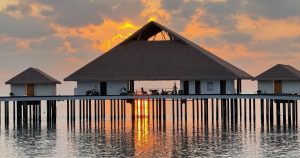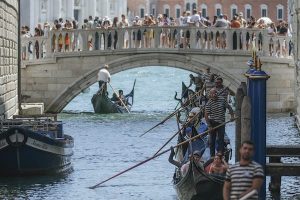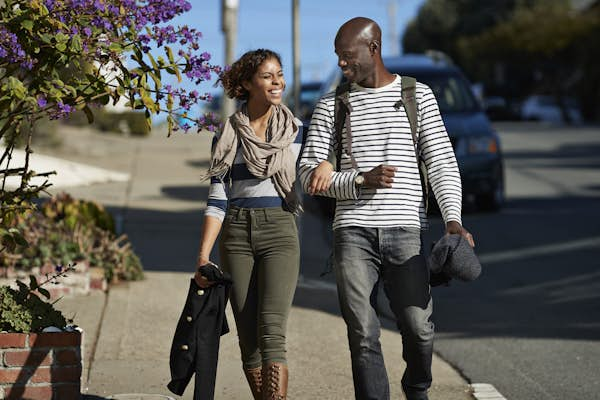
San Francisco’s mild weather makes it a consistent year-round attraction, which is a bonus for visitors looking for flexible travel dates. Our peninsula-shaped city is often covered with a comforting blanket of fog (known affectionately as Karl) that is formed by the hot sun evaporating ocean waters that then collide with cold air created from a coastal cold water current before getting sucked in through the Golden Gate and pushed by Easterly winds.
First-time summer visitors often end up shivering in shorts and hastily wrapping up in SF sweatshirts acquired at the nearest gift shop. Just in case you were in doubt – summer is not the warmest time to visit. There are vibrant summertime events that still make a visit worthwhile, but sun lovers should wait until late summer or early fall to visit SF for perfectly warm (but not too hot!) sunny days.
That said, there are still distinctive seasons to experience throughout the year, resulting from a combination of nature and our lovely, quirky, diverse SF cultures. Spring blooms, seasonal farmers markets, both wholesome and raunchy street festivals, and migrating whales are just some of what various months have to offer. Here’s how to judge the perfect time for you to visit San Francisco.
Get local insight on destinations all over the world with our weekly newsletter delivered to your inbox.
March through October is best for building a beach campfire
When wanting to balance bar-hopping nightlife and shopping with a little nature downtime, or if needing a family-friendly activity, consider the fact that March through October is Burn Season at Ocean Beach on the westernmost edge of the city.
The 16 fire rings are open from 6am to 9:30pm daily on a first-come-first-served basis. If the rings are full, ask to share and offer to contribute firewood or snacks. First, check online for no-burn days due to occurrences like wildfires or Spare the Air days. Burn season also includes the summer solstice in June – the longest day when the sun sets after 9pm, giving you time to enjoy a leisurely, brilliantly orange sunset well into the night.
Wear layers to withstand the wind and BYO firewood, which is available nearby at Safeway on La Playa and Fulton streets, or the 7-Eleven on 46th Ave. and Judah St. There are parking spots and bathrooms nearby. For public transport options, take MUNI buses 5R or 18, or MUNI metro line N Judah.
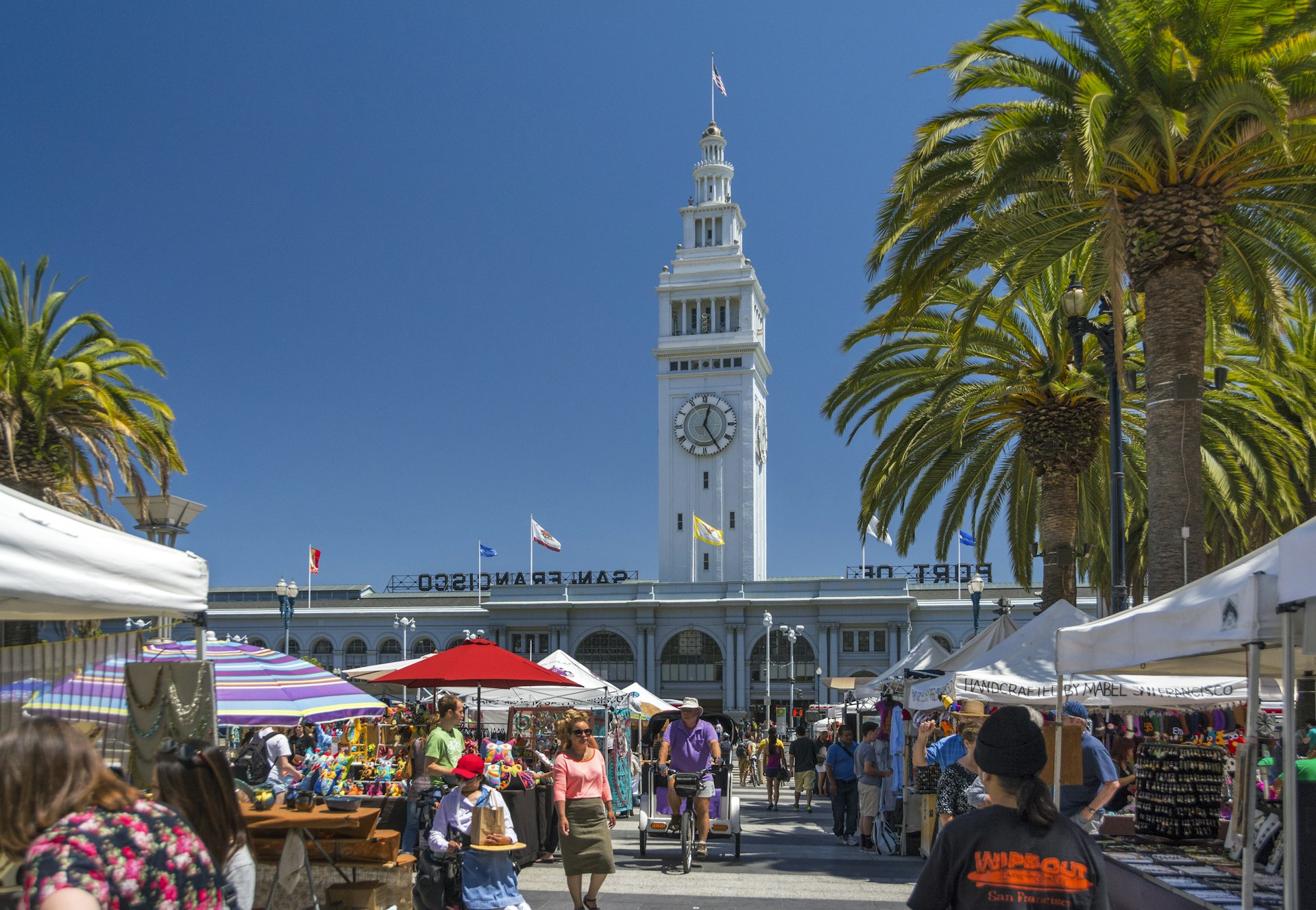 San Francisco has some of the best farmers’ markets in California ©
San Francisco has some of the best farmers’ markets in California ©
March to November is best for farmers’ markets
California grows much of the country’s produce, and San Francisco’s farmers’ markets get the freshest, most peak-season goods since we’re so close to growing regions such as Salinas (“America’s Salad bowl”), Gilroy, San Joaquin Valley, and many more.
A handful of farmers markets here only operate roughly March through November, but we’re lucky that the majority of the city’s 20-plus farmers markets open year-round. Still, nothing beats the abundance of produce available during the non-winter months. Get juicy, ruby-red strawberries and cherries during the summer (if you can get in line early enough – competition can be fierce), and tart, citrusy nopales (cactus pads) through fall.
Some favorite farmers markets include Civic Center’s vital Heart of the City Farmers Market, the Ferry Plaza Farmers Market (go on its massive Saturdays), the sprawling Outer Sunset Farmers Market and Mercantile, and a new farmers market in the Bayview created by Dragonspunk.
February to May is best for whale-watching
Majestic gray whales, orcas and humpbacks all pass by our state’s coastline during their respective migration seasons. While it’s possible to spot at least one species’ migration year-round, the overlap months for all three species usually runs from February to May.
Since a 1985 international moratorium on whaling, the population has made a healthy comeback. Climate change’s recent warmer ocean temperatures have also driven the increased number of whales closer to SF and, at times, actually into the Bay itself. During peak whale season, you don’t even need binoculars (though, of course, they’re helpful). Some whales get close to shore, and in clusters, so it’s easy to spot them by their blowhole activity, then watch their flippers and long bodies breach and lobtail.
If you want to stay in SF proper, sign up for whale boat tours with San Francisco Whale Tours or Oceanic Society. Or plant yourself at Lands End Lookout. Otherwise, there are tons of whale-watching spots up and down the coast. For places relatively close to the city, consider Point Bonita Lighthouse north in Marin, or go a bit south of SF to Mussel Rock on the Daly City-Pacifica border.
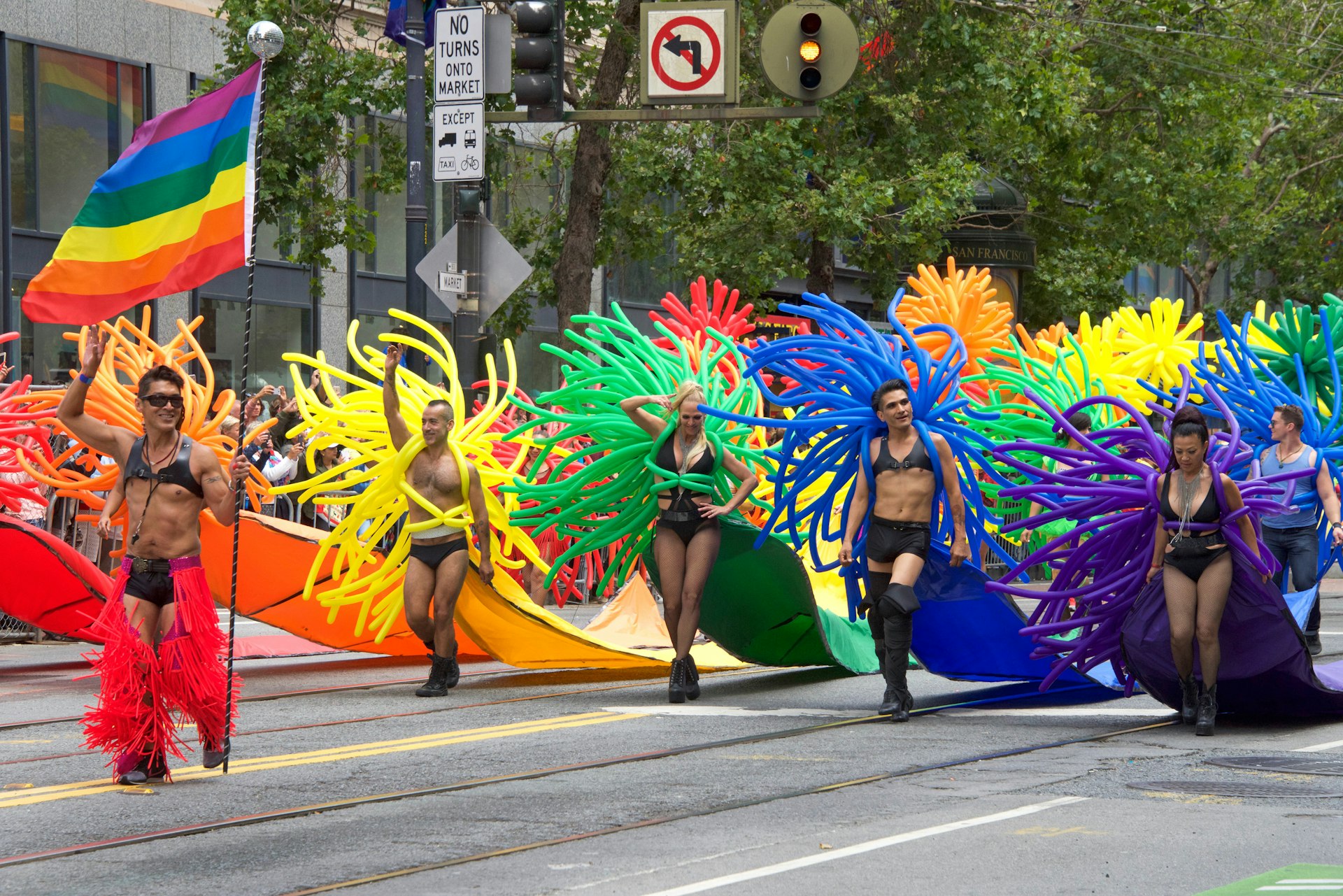 San Francisco celebrates the spirit of Pride throughout June © Sheila Fitzgerald / Shutterstock
San Francisco celebrates the spirit of Pride throughout June © Sheila Fitzgerald / Shutterstock
April through October is best for festivals
Our April and October might look and feel similar weather-wise, but the city creates distinctive seasons through the vibrant street festivals offered spring through fall. Whether cold and foggy or sunny and clear, the vibes are always celebratory.
Two highlights of the festival season begin a little early with indie music-filled Noise Pop Festival and SF’s famous Chinese New Year Parade in February. Then spring brings the 50-year-old Nihonmachi Street Fair (a.k.a. Cherry Blossom Festival) in April in Japantown, which is only 1 of only 3 Japantowns in the nation. The side block parties along the 12K Bay to Breakers route in May definitely count as their own festival, and film fans can enjoy CAAMFest during AAPI Heritage Month.
June brings the very SF celebration of LGBTQIA+ Pride Month and its highly anticipated parade. The free Stern Grove Festival concert series has a lovely long runtime on Sundays from June through August. July brings the historic Fillmore Jazz Festival. Major musical headliners pack Outside Lands in August, in addition to having become a huge food and beverage event on its own. BDSM-themed Folsom Street Fair basks in September’s late summer weather.
The free Hardly Strictly Blue Grass rocks Golden Gate Park in late September and early October. SOMA Pilipinas’ UNDSCVRD night market takes over the district a few times a year, including in October. Post-festival season, the holidays still hold a few additional treats, like various maker fairs and holiday markets, especially in December.
May is best for mind-blowing super blooms
Even though Karl the Fog helps make the city’s mild weather year-round a draw, there’s still an awakening in the air once the rainy season is over and wildflowers and people alike start to peep their heads out. It’s no joke that April showers bring May flowers.
If the rainy season was particularly heavy, outdoor lovers will be treated to wildflower super blooms seemingly everywhere, from unexpected clusters of richly orange California poppies on freeway medians to what news outlets named the best super bloom of 2023 at Mori Point in Pacifica, just south of SF. The hillsides were flooded with thick carpets of buttery yellow goldfields and white-ended tidy tips. While blooms may peak in late April or early May, plenty of destination-worthy blooms can often remain in the city and around it well into June.
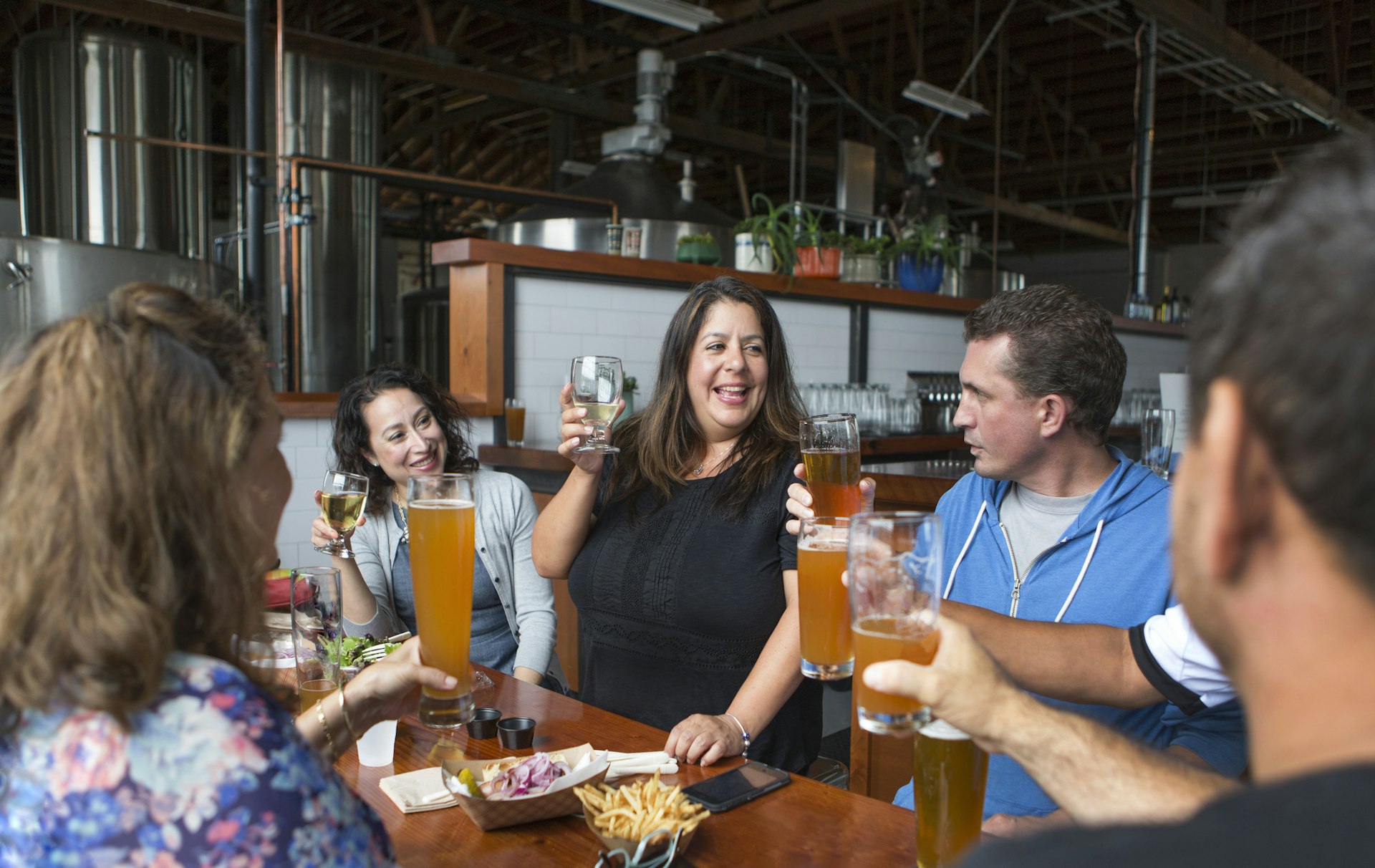 Snag a reservation at a popular restaurant when the locals decamp to Burning Man © Billy Hustace / Getty Images
Snag a reservation at a popular restaurant when the locals decamp to Burning Man © Billy Hustace / Getty Images
Burning Man (usually late August to early September) is the best time to snag a dinner reservation
There is still plenty of counterculture and a deeply creative community in San Francisco. That’s why seemingly half the city clears out during the annual Burning Man festival in Black Rock City, Nevada during the week leading up to and including Labor Day (the festival’s headquarters are in SF). The rest of San Francisco relishes this time, when going out on a Saturday night is a breeze in certain parts of the city.
SF has been a bit quieter in its post-pandemic state, but restaurant reservations have been ticking up, and it’s still worth checking out places you would usually never consider around this time. You can find parking almost anywhere and snag a normal-time dinner reservation for places that usually seem impossible, like the new California State Bird Provisions, modern Italian American Flour + Water, or Michelin-starred contemporary Korean San Ho Won. Waltz into the belly of the Mission District’s bar scene around 16th and Valencia, or other bar-heavy areas like Hayes Valley.
Late August through mid-October is San Francisco’s true (late) summer
It’s very on-brand that our summer months are actually extra foggy, and August in particular is referred to as “Fogust.” The culmination of hotter summer weather surrounding SF creates intense marine layers that, in turn, create more fog. For fog aficionados, hang out in the southwestern neighborhoods, like the Outer Sunset, to experience the thick of it.
As ocean temperatures get warmer in September, less fog forms, plus hot inland air gets blown toward the coast. Make way for what many San Franciscans call “Indian summer,” though the locally well-known term is not politically or even scientifically correct.
Perhaps opt to call the season “late summer,” which usually lasts until mid-October.
The warm weather and subsequent relaxing vibes are perfect for outdoor activities, whether hiking, a street festival, or just sitting in a park. Visiting SF during our late summer also works out budget-wise, as traveling during fall tends to be cheaper.
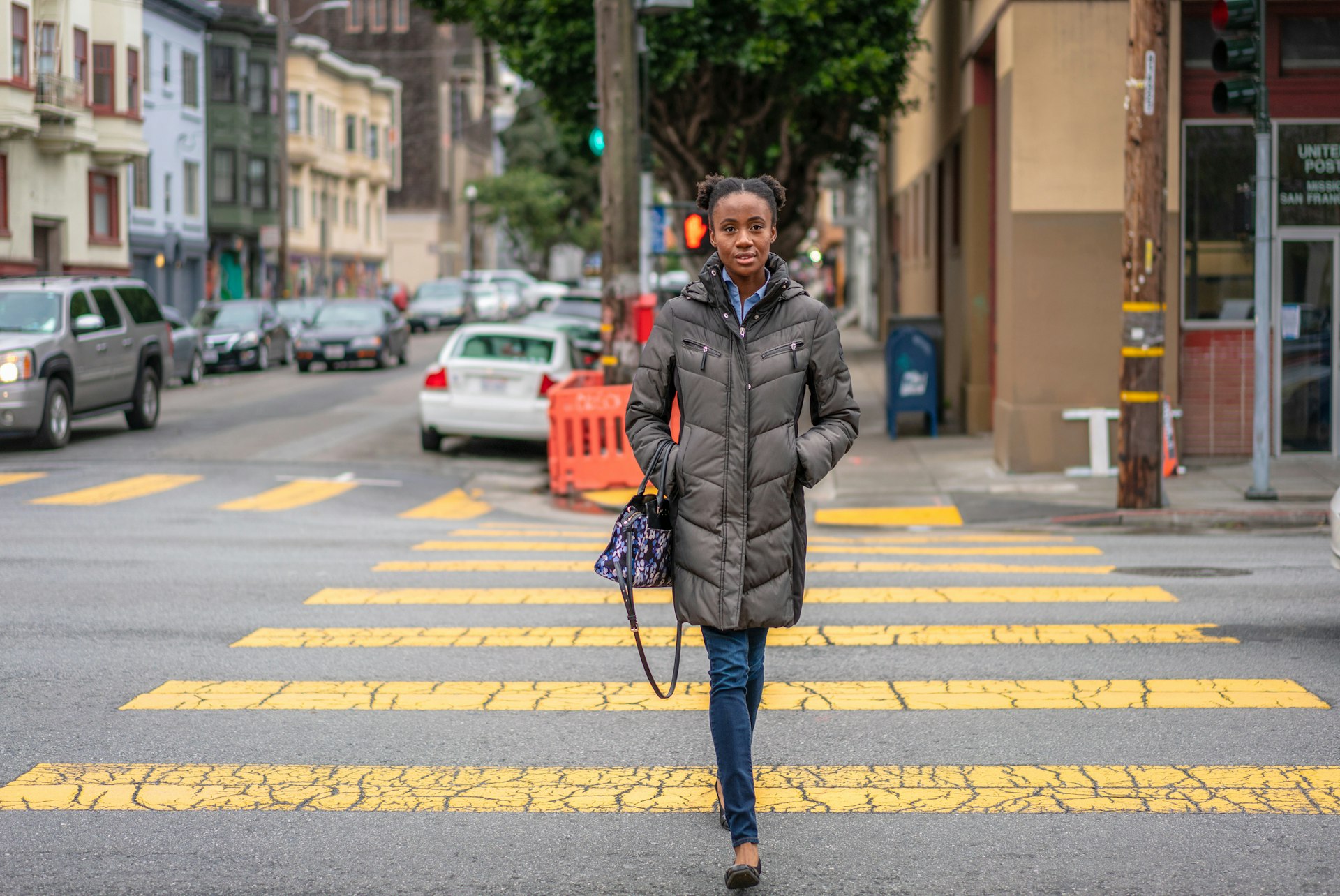 Pack a coat for the winter chill and enjoy the Christmas lights © georgeclerk / Getty Images
Pack a coat for the winter chill and enjoy the Christmas lights © georgeclerk / Getty Images
December is best for stunning light displays
SF’s winter weather is mild (unsurprisingly), albeit slightly cooler and perhaps a bit rainy compared to the rest of the year. Even if you don’t celebrate Christmas, the holiday light displays around the city are still a cheerful foil to the early winter darkness. Typical tourist destinations one might normally avoid really deliver with the holiday lights, like Fisherman’s Wharf and Pier 39. Next to their extravagant lights and decorations are also winter outdoor ice rinks that pop up on The Embarcadero and in Union Square.
City Hall employs 220 LED lighting fixtures that bathe the majestic exterior in red and green during Christmas, plus other year-round light combinations like a rainbow for Pride month in June and blue and gold for Golden State Warriors’ victories. Fancy hotels like the Ritz-Carlton have annual holiday light and decoration extravaganzas, and the Fairmont creates a life-sized gingerbread house. Cruise through some of the city’s ritzier neighborhoods like Pacific Heights for huge, glittering displays.
IlluminateSF is an annual city-wide winter lights festival (a mixture of temporary and permanent fixtures) that encompasses installations across neighborhoods, from glowing lanterns in Chinatown to a forest of light in Golden Gate Park.
A bonus to visiting the city during the holidays is SPCA’s annual window displays of puppies and kittens available for adoption at Macy’s Union Square — not a physical light display, but something that will certainly light up your heart.


